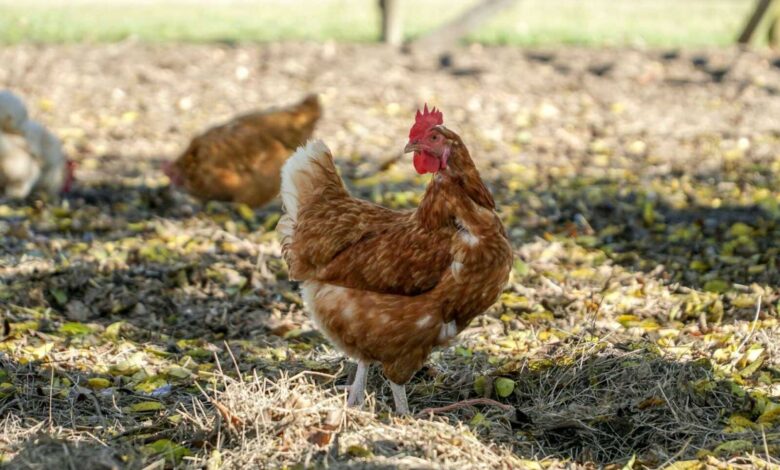Chicken Wellness: Owning and caring for a Backyard Flock

Owning and caring for a backyard flock is a rewarding journey, and ensuring the well-being of your feathered friends is crucial. This comprehensive guide aims to be your trusted companion, providing detailed insights and practical tips for maintaining the chicken wellness and happiness.
Table of Contents
Essential Chicken Health Basics
Preventing Chick Ailments
Begin your journey into optimal chicken health by understanding the basics. Explore chicken anatomy, physiological considerations, and the common stages of their lifespan. Delve into early chick care, ensuring a healthy start for your feathered friends.
Basic understanding:
- Anatomy overview: Key body parts and functions.
- Physiological considerations: Unique aspects of chicken biology.
- Lifespan stages: From chicks to adulthood.

Coop Hygiene and Sanitation
Nutritional Needs for Optimal Health
A clean coop is the foundation of chicken health. Learn effective hygiene practices to prevent fecal-borne diseases. Explore the importance of proper sanitation and maintaining a clean environment for the well-being of your flock.
Hygiene essentials:
- Coop cleaning routines: Frequency and thoroughness.
- Fecal-borne diseases: Prevention and early detection.
- Clean environment benefits: Reducing stress and promoting health.
Chicken Body Language and Signs of Illness
Veterinary Care for Chickens
Understanding your chickens’ body language is key to early illness detection. Explore common signs of distress or illness and learn how to take prompt action. Dive into the importance of regular veterinary care, scheduling checkups, and addressing serious health issues.
Body language cues:
- Signs of distress: Changes in behavior or posture.
- Early illness detection: Observing subtle changes.
- Veterinary care benefits: Preventative measures and early intervention.
Natural Remedies and Holistic Care
Enrichment Activities for Happy Hens
Explore natural remedies and holistic care for minor chicken ailments. Learn about the benefits of herbs, essential oils, and alternative approaches to enhance your chickens’ well-being. Additionally, discover the importance of enrichment activities for mental stimulation and preventing boredom.
Holistic care options:
- Herbal remedies: Safe and effective choices.
- Essential oils: Proper application and benefits.
- Enrichment activities: Toys, treats, and play for happy hens.

Predatory Threats and Coop Security
Building a Strong Immune System
Safeguard your flock from predatory threats by implementing effective coop security measures. Explore common predators, their behaviors, and how to protect your chickens. Additionally, focus on building a strong immune system through stress management, natural boosters, and parasite prevention.
Predator protection:
- Identifying common threats: Foxes, raccoons, and more.
- Coop security measures: Fencing, lighting, and surveillance.
- Immune system support: Stress reduction and natural supplements.
Seasonal Health Considerations
Poultry Breeds and Specific Health Concerns
Address the impact of changing seasons on your flock’s health. Learn how to winterize your coop, manage summer heat, and adapt care practices to weather changes. Understand the specific health concerns associated with different poultry breeds.
Seasonal adjustments:
- Winterizing coop: Insulation, heating, and care adjustments.
- Summer heat management: Providing shade and cool areas.
- Breed-specific considerations: Tailoring care to unique needs.
Maintaining Proper Egg Hygiene and Food Safety
Emergency Preparedness for Chicken Owners
Ensure the safety of your eggs and maintain proper hygiene standards. Explore strategies for preventing Salmonella and other bacterial contaminations. Additionally, prepare for emergencies by learning how to respond to injuries, predators, and natural disasters.
Egg safety measures:
- Hygiene practices: Nest boxes, cleaning, and storage.
- Bacterial contamination prevention: Recognizing and addressing risks.
- Emergency response: First aid, predator deterrents, and disaster preparedness.

Building a Community of Chicken Keepers
Building a Relationship with a Local Veterinarian Specializing in Poultry
Connect with fellow chicken keepers to share knowledge, provide support, and access valuable resources. Join local or online communities to enhance your understanding of optimal flock wellness. Additionally, establish a relationship with a local veterinarian specializing in poultry for expert advice and care.
Community building:
- Online forums and groups: Engaging with chicken enthusiasts.
- Local connections: Networking with nearby chicken keepers.
- Veterinary relationships: Finding specialized poultry care.
FAQ: Chicken Wellness
Q1: How can I prevent common chicken ailments in young chicks?
Ensuring optimal health for young chicks involves a combination of proper nutrition, hygiene, and early detection of signs of illness. Implementing biosecurity measures and providing a clean environment are crucial.
Q2: What are the signs of illness in chickens, and how should I respond?
Understanding chicken body language is key to identifying signs of illness. Changes in behavior, posture, or eating habits may indicate a health issue. Promptly consult with a poultry veterinarian for accurate diagnosis and treatment.
Q3: What natural remedies can I use for minor chicken ailments?
Herbs, essential oils, and alternative approaches can be effective for minor chicken ailments. Consult with a poultry-savvy veterinarian for guidance on safe and appropriate usage.
Q4: How do I protect my flock from predatory threats?
Implementing coop security measures, such as sturdy fencing, adequate lighting, and surveillance, can deter predators. Understanding the specific threats in your area and adapting security measures accordingly is crucial.
Q5: What are the seasonal considerations for chicken health?
Seasonal adjustments include winterizing the coop with insulation and heating during colder months and providing shade and cool areas during the summer. Tailor care practices to address the unique needs of different poultry breeds.
For personalized advice on chicken wellness, consult with experienced poultry veterinarians and actively participate in chicken keeping communities.
Chicken Wellness
In conclusion, this guide empowers you with the knowledge and practical tips needed to foster optimal chicken wellness for your backyard flock. From understanding their physiology to implementing enrichment activities, each section contributes to the holistic well-being of your chickens. Here’s to your flock’s health, happiness, and countless clucks of contentment!

Bonus Content:
Organic chicken care and sustainable practices
Embrace sustainable and organic practices in chicken care. Learn how ethical and eco-friendly approaches can contribute to the well-being of your flock while minimizing your environmental footprint.
Raising chickens in cold climates
Cold climates pose specific challenges. Explore detailed strategies for caring for your chickens during winter, ensuring their health and comfort despite the harsh conditions.
Managing common chicken parasites and pests
Effective pest management is vital. Dive into the details of managing and preventing common chicken parasites, safeguarding your flock from discomfort and potential health issues.
Utilizing technology for monitoring chicken health
Leverage technology for proactive health management. Explore how modern tools and gadgets can assist in monitoring and maintaining the health of your chickens, providing valuable insights for timely interventions.
Ethical considerations and animal welfare in backyard chicken keeping
Prioritize the ethical treatment of your flock. This section explores practices that promote animal welfare, ensuring a harmonious and compassionate environment for your chickens.
Building a relationship with a local veterinarian specializing in poultry
Establishing a strong connection with a poultry-savvy veterinarian is crucial. Learn how to build a relationship with a local vet, ensuring professional support for your flock’s health and well-being.








